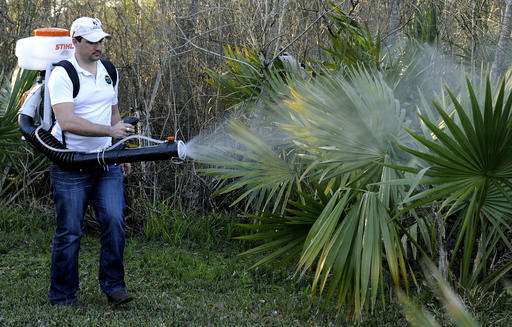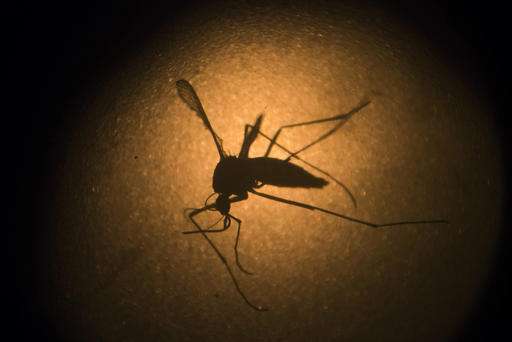Q&A: A look at Texas' first homegrown case of Zika

Health officials are going door-to-door in the Texas neighborhood of a woman who is believed to be the first person to contract the Zika virus by getting bitten by a mosquito in that state.
Officials are offering to test the woman's neighbors in Brownsville, which is on the border with Mexico, and are educating them about how to fight the spread of the disease, including how to reduce the breeding habitats of the mosquito that transmits it. But experts don't expect big outbreaks in the U.S. like those that have happened in parts of Latin America and the Caribbean.
Thus far, Florida is the only other state with homegrown cases of the disease. It typically causes only mild symptoms, at worst, but the disease is especially dangerous to pregnant women, as it can cause severe birth defects, including babies born with unusually small heads.
Here are some questions and answers about Zika:
___
HOW DOES ZIKA SPREAD?
Zika is transmitted to people primarily through the bite of an infected Aedes aegypti species mosquito, but it can also be spread during sex. Most infected people don't even have symptoms, but for those who do, it's usually a mild illness, with fever, rash and joint pain.
Even though it's late in the season, mosquitoes can still spread Zika in some areas of the country, said Tom Frieden, director of the Centers for Disease Control and Prevention.
Chris Van Deusen, a spokesman for the Texas Department of State Health Services, said that because of the warm conditions in South Texas, mosquitoes can be a concern year-round. But he noted that much of Texas is at the end of its mosquito season.
___
WHAT ARE THE DETAILS OF THE TEXAS CASE?
State health officials announced the Brownsville case on Monday, noting that testing showed that at this point, the virus can no longer be spread from her by mosquitoes.
Though Brownsville is on the Mexico border, the woman said she hadn't recently traveled to Mexico or anywhere that was experiencing a Zika outbreak, and she didn't have any other risk factors, health officials said. She isn't pregnant.
Officials said further investigation is necessary to figure out how she was infected. But Van Deusen said the most likely scenario is that someone who got infected in an area where Zika is widespread traveled to South Texas and was bitten by a mosquito, which later bit the woman.
___
WHY DON'T AUTHORITIES THINK ZIKA WILL BECOME WIDESPREAD IN TEXAS?

One reason health officials don't think Zika will become widespread in Texas is because of the state's experience with dengue fever, Van Deusen said. He said the same mosquito species spreads both diseases, and that when there are dengue epidemics in Mexico, cases have spilled over to South Texas but haven't been widespread.
Window screens and air conditioners are more commonly used in Texas, which has helped tamp down transmission, as the screens act as a barrier to mosquitoes and the air conditioning means windows are more often closed. Van Deusen noted that the mosquito species that transmits Zika doesn't travel more than a couple-hundred yards, and people don't live as close together in Texas.
___
WHAT CAN YOU DO?
Experts say people need to protect themselves from mosquito bites, especially in areas that stay relatively warm in the fall and winter. That includes using insect repellent, wearing clothes that cover most skin, keeping mosquitoes out of homes and removing standing water where mosquitoes can breed.
Van Deusen said that at this point, there's no particular advisory for pregnant women in the Brownsville area, other than that they should be protecting themselves from mosquito bites.
___
WHAT'S THE HISTORY OF ZIKA IN TEXAS?
Through last week, Texas has had 257 confirmed Zika cases that were all associated with travel, including two infants born to women who traveled while pregnant and two people who had sex with infected travelers.
___
WHAT IS THE POSSIBILITY OF IT APPEARING IN OTHER STATES?
Van Deusen said a Zika case is possible anytime an area has the mosquito species that spreads the disease and residents who have been traveling to places where there's widespread transmission.
A Centers for Disease Control and Prevention map shows that in addition to being in the southern U.S., the range of the Aedes aegypti mosquitoes may extend into parts of the Midwest and as far north as New York and Connecticut.
__
HOW DO THINGS STAND IN FLORIDA?
Since people began contracting the Zika virus in the Miami area over the summer, there have been 240 such cases in Florida. Two areas have since been cleared as being part of the transmission zone, and it's still spreading in two other areas.
Florida Department of Health spokeswoman Mara Gambineri said there has been a decrease in the last few weeks in locally transmitted cases, and that while it doesn't get cold enough to eliminate all mosquitoes, there are fewer as it gets cooler.
© 2016 The Associated Press. All rights reserved.















